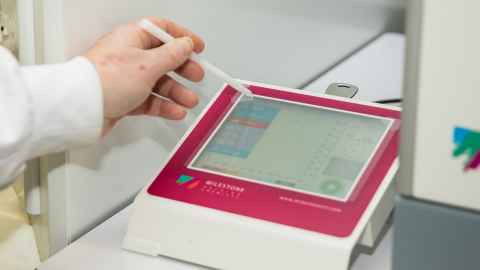Green chemical science for a sustainable future
Green Chemical Science is the use of chemical principles, science and technology to advance society in ways that are benign to the environment and sustainable for the foreseeable future.

Globally, humanity faces many challenges such as pollution, resource depletion, energy demands, inadequate food supply and lack of clean water.
Our research aims to address these challenges by using Green Chemical Science approaches to develop sustainable solutions. We focus on the use of renewable feedstocks, methods of pollutant remediation, designing environmentally benign chemical synthesis and reducing waste in food production and storage.
Contacts at the University of Auckland
You can search our database to find contacts at the University using the tags below.
| Department |
| Fields of Research |
| Graduate Supervision |
| Media Enquiries |
Research topics
The use of renewable feedstocks
Currently, most of the world's chemical products come from non-renewable petrochemical sources. Our research focuses on developing new technologies for extracting and preparing chemical products from alternative renewable feedstocks, which include the use of primary industry products and wastes.
Sustainable chemical synthesis
Reducing the environmental impact of chemical synthesis is an important research topic for our school. We investigate the design of new, more efficient catalysts, the development of alternative environmentally benign solvents and the use of novel synthetic methods.
Reducing and reusing food waste
Food waste is an underutilised resource and represents a significant contribution to global greenhouse gas emissions with important social consequences. Our approach to combating food waste includes developing methods to increase the shelf-life of food and the use of food waste as a feedstock in the preparation of new materials and chemical products.
Remediation of pollutants
We are developing new methods of eliminating environmental pollutants. Our research includes the development of new catalysts, materials and methods for the removal and degradation of environmentally hazardous compounds, especially those found in soil and water. We also investigate methods for mitigating greenhouse gas emissions.
Renewable energy production and storage
To alleviate the environmental impact of most current energy generation methods, we must produce new approaches for the generation and storage of energy using renewable, non-polluting sources. The focus of our research is on the design of materials capable of preparing energy carriers, such as hydrogen from renewable sources and the development of new approaches for energy storage.
Our researchers
Professor David Barker
- Biorenewable resources for the synthesis of complex materials
- Organocatalysts in organic synthesis
Dr Rebecca Deed
- Biowaste valorisation
Professor Bruno Fedrizzi
- Analytical and bioanalytical mass spectrometry
- Wine and food chemistry and biochemistry
- Adding value to horticultural waste
Associate Professor Daniel Furkert
- Natural product synthesis
- New reaction mechanisms
- Drug discovery
Professor Paul Kilmartin
- Electrochemistry
- Valorisation of grape marc
- Sustainable photosensitsers for photocatalysis,
photobiology and photophysics - Photocatalysis for sustainable chemical synthesis
and pollution remediation - Supramolecular approaches towards artificial
photosynthesis
Associate Professor Erin Leitao
- Environmentally friendly polymers
- New materials from abundant feedstocks
- Catalytic reactions without solvents or in green solvents
Professor Dr Viji Sarojini
- Green peptide and pharmaceutical synthesis
- Waste materials for water disinfection
- Greenhouse gas mitigation
Professor Tilo Söhnel
- Inorganic materials chemistry
- Crystallography
Professor Geoffrey Waterhouse
- Electrocatalysts for water splitting, fuel cells and batteries
- Solar-driven catalytic reactions
- Carbon dioxide capture and catalytic conversion
Associate Professor Cameron Weber
- Development of alternative solvents
- Renewable feedstocks for chemicals and materials
- Less hazardous methods for chemical synthesis
Professor L. James Wright
- Water purification
- Catalysis
- Chemistry with earth abundant metals
- Catalyst development
- Mechanism of catalysis